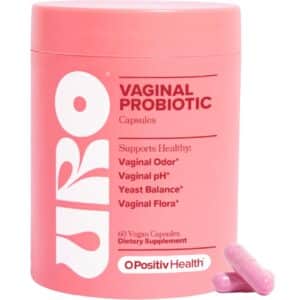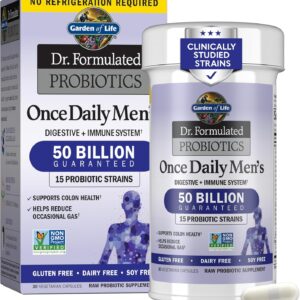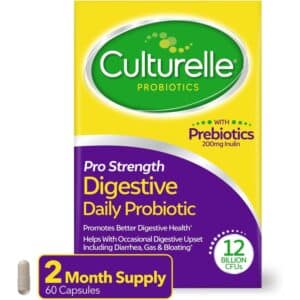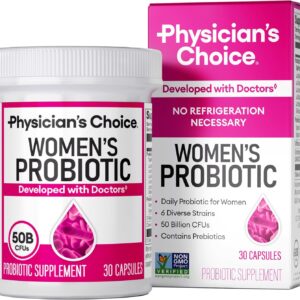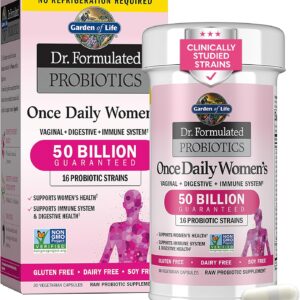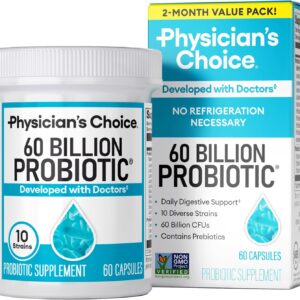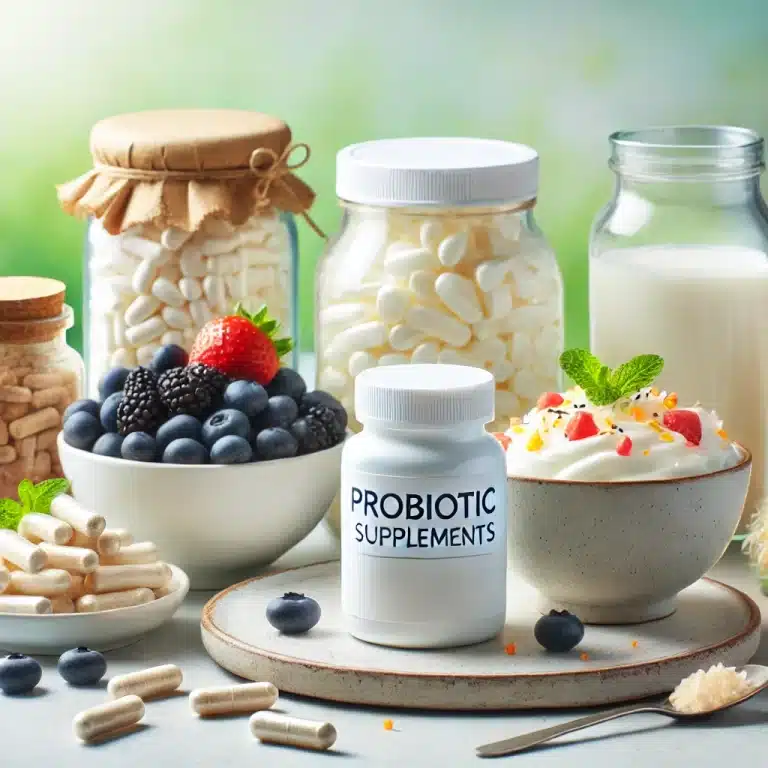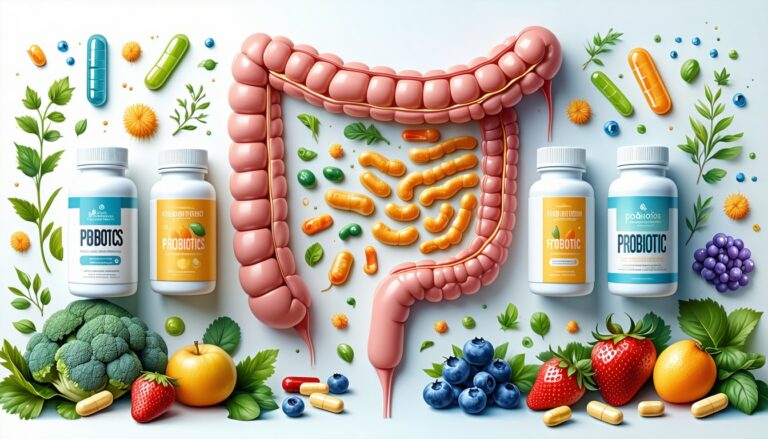Probiotic Supplements for Gut Health are gaining popularity as more people realize the critical role the gut plays in overall wellness. From improving digestion and easing symptoms of IBS to boosting immunity and even supporting mental health, probiotics are proving to be more than just a passing trend. This article dives into the essentials of probiotic use—covering their benefits, sources, and how to choose the right supplement—so you can make an informed decision for your digestive and overall health.
Understanding Probiotics
Role of Probiotics in Gut Health
Probiotics, those tiny living friends of yours, do wonders for your gut. Think of them as your digestive system’s cheerleaders, encouraging everything to move along smoothly. They play a big part in keeping your gut in check, especially when things get a little chaotic. When your tummy isn’t quite right because the good guys are outnumbered by the bad, probiotics step in to balance things out.
Adding probiotics to your meals can be a game-changer for your digestion. They help nurtures the growth of friendly bacteria, keeping things moving like clockwork and helping you dodge discomforts like bloating. Curious about how these wonder bugs help? Check out more in our article about digestive probiotics.
Sources of Probiotics
You can boost your probiotic intake through foods and supplements. Here’s a list of where to find these gut-loving bugs:
| Probiotic Source | Description |
|---|---|
| Yogurt | Packed with live cultures like lactic acid bacteria and bifidobacteria, it’s great for your gut and may help if milk makes your stomach grumble (Healthline). |
| Kefir | This is yogurt’s more adventurous cousin, with even more strains that aid in digestion and possibly support your bones too. |
| Sauerkraut | Fermented cabbage bringing probiotics and fiber to the table. |
| Kimchi | A spicy vegetable delight, high in probiotics, perfect for your gut party. |
| Miso | Fermented soybeans that can jazz up soups and help your gut out. |
If chomping on these foods doesn’t always fit into your schedule, or if you’ve got specific health goals in mind, probiotic supplements for gut health might be your answer. They’re great for packing in the good stuff when you need it. But always have a quick chat with your doc before starting any new supplements.
Benefits of Probiotics
Probiotics aren’t just the little guys under the microscope; they’re your gut’s best buddies and can boost how you feel day in, day out. Let’s get to know these beneficial buggers and see how they can snuggle right into your health routine.
Impact on Digestive Health
Probiotics are the live critters—yep, actual bacteria and yeast—that keep your tummy in tip-top shape. They help your food glide smoothly on its journey, keeping you comfortable and things working like a well-oiled machine (WebMD). Here’s why they’re absolute legends for your gut:
| Benefit | What’s It Do? |
|---|---|
| Better Digestion | They break down your grub efficiently, so your body can soak up all those good nutrients. |
| Microbiome Balance | Probiotics encourage the good bacteria to party and help kick out the unwanted guests that cause tummy troubles. |
| Ease IBS and Gut Issues | Studies show probiotics can give relief from IBS nuisances and other digestive problems (WebMD). |
| Regular Visits to the Throne | Probiotics help keep things regular, waving goodbye to constipation struggles. |
Potential for Overall Wellness
These little powerhouse germs offer more than just a happy belly. A healthy gut vibe from probiotics is linked to all sorts of perks, like less inflammation and a stronger defense against bugs, impacting your whole body (Cleveland Clinic). Here’s how they help:
| Helping Hand | The Scoop |
|---|---|
| Immunity Boost | Probiotics can give your immune system a leg up, making it tougher against sickness (probiotics immune system). |
| Mind Matters | There’s chatter about your gut and brain being besties. Probiotics might help with more stable moods too. |
| Preventing Illness | They might ward off some long-term stomach diseases, so they’re a worthwhile addition to your health squad. |
| Hormone Harmony | A happy gut can help smooth out the ups and downs of certain hormones, thanks to probiotics. |
Bring probiotics into your life through supplements or by munching on probiotic-rich foods, and you’ll be doing your gut and your whole self a huge favor. But remember, everyone’s health needs are different, so it’s wise to chat with a healthcare pro if you’re unsure about introducing them.

Different Probiotic Strains
Alright, so you’re diving into the magical universe of probiotics. Buckle up because each little microorganism has its own party trick. Let’s talk about two pretty famous attendees on the guest list: Lactobacillus GG and Saccharomyces boulardii.
Lactobacillus GG
Let’s start with Lactobacillus GG, or as its pals call it, LGG. This one’s like the prom queen of probiotic strains; everybody knows it, and it seems to win all the popularity contests in scientific circles. It’s famous for being a champion of tummy tranquility and a cheerleader for your immune system. Studies—even at NIH Office of Dietary Supplements—back this up, showing its knack for cutting down on antibiotic throwback side effects like diarrhea, both in kids and grown-ups. Who doesn’t appreciate that, right?
What LGG does is keep your gut squad in harmony, boosting the good guys while standing up to the no-good bacteria invaders.
| Benefit | Here’s What It Does |
|---|---|
| Kicks Antibiotic Diarrhea | Wrestles with AAD so you don’t have to. |
| Boosts Immune System | Armors up your defenses against germs. |
| Keeps Your Gut Happy | Maintains balance and regularity. |
Craving more about probiotics giving your gut some TLC? Here’s where to go: probiotics for gut health.
Saccharomyces boulardii
Now meet Saccharomyces boulardii, the wild card, thriving even when things get rocky in your digestive system—and it’s not even a bacteria; it’s a yeast! Talk about standing out in the crowd! This sprightly strain can handle a variety of gut challenges, from travel mishaps to antibiotic throw-downs.
Like LGG, it plays well by fortifying your gut’s territory, tackling undesirable bacteria and fungi, and vibing up your digestion scene.
| Benefit | What It’s Up To |
|---|---|
| Champions Digestion | Takes on all kinds of diarrhea nuisance. |
| Shrugs Off Antibiotics | Kicks into gear even when meds are in the mix. |
| Supports Immune Action | Strengthens that gut wall and quells inflammation. |
Got gut grumbles? Saccharomyces boulardii might be your buddy in a bottle. To scope out more digestive pals, swing by: digestive probiotics.
In your pro-gut health quest, both Lactobacillus GG and Saccharomyces boulardii deserve the spotlight. Grab these probiotics and let your digestive system thrive. Curious about more options? Peek at our round-up of probiotic supplements for gut health to start feeling your best self.
Probiotics vs. Prebiotics
Getting a grip on the difference between probiotics and prebiotics can be the secret sauce to keeping your gut happy. Both have their own unique gigs when it comes to supporting your digestion, but they do their magic in different ways.
Differentiating Between the Two
Probiotics are little live critters like bacteria or yeast, you know, those busy bees that do wonders for digestion. They’re like your gut’s best buddies, boosting wellness in ways you never knew you needed. You can snag probiotics from items like yogurt and sauerkraut or stock up on capsules and powders if that’s more your speed.
Then we have prebiotics – they’re the unsung heroes, the complex carbs that your gut bugs feast on. Think of them as the power breakfast that boosts the bacteria. You’ll find these champs in garlic, onions, bananas, and asparagus. Bet your grocery list just got a bit longer!
| We’re Talking About | Probiotics | Prebiotics |
|---|---|---|
| What They Are | The live bacteria | The food for those bacteria |
| What They Do | Make your gut happy | Keep those bacteria well-fed |
| Where They’re Found | Yogurt, kefir, pills | Garlic, onions, bananas |
When a product labels itself as synbiotic, it’s just boasting about having both probiotics and prebiotics rolled into one. This combo makes sure those probiotics make it all the way to your gut safely.
Synbiotics and Postbiotics
Synbiotics are like those two-for-one deals you can’t resist – prebiotics and probiotics working together to make your gut even more awesome. It amps up the probiotic action since prebiotics are the sidekicks that probiotics need to shine.
Now, enter postbiotics – they’re not alive, but don’t brush them off. These are the goodies that probiotics leave behind after doing their thing. Full of enzymes, peptides, and organic acids, they help out with gut health and might even give your immune system a bit of a pep talk.
Knowing your probiotics from your prebiotics can help you zero in on the probiotic supplements for gut health you might want to add into your life. And if you’re on a mission for more gut insights, peek into our write-ups on digestive probiotics and prebiotics for gut health.
Adding Probiotics
Introducing some probiotics into your daily habits can work wonders for your tummy. You’ve got a couple of choices: popping probiotic pills or munching on probiotic-packed chow. Either way, it’s like giving your health a little love tap.
Probiotic Pills
These handy little supplements drop some friendly bacteria and yeasts into your belly, helping kick the nasty germs to the curb and giving your immunity a boost. Stuff to check when picking a probiotic pill:
| Thing | What It’s All About |
|---|---|
| Bacteria Count (CFU) | At least a billion guys in there |
| Available Types | Pills, powders, and liquid love |
| Bacteria Varieties | Got different types for your specific needs |
| Daily Amount | From a million to 10 billion buddies |
More ain’t always better, so find what suits you best. Brands like Nordics Naturals have combos for everyone, young or… ‘young at heart’.

Probiotic-Packed Foods
Besides popping pills, there’s something delightful about sneaking probiotics into your meals. These foods are alive in a good way and help keep your gut happy. Some tasty picks:
- Yogurt: Look for the “live cultures” label like it’s VIP access.
- Kefir: It’s a drink that feels like a yogurt party.
- Sauerkraut: Cabbage that’s been through a wild fermentation ride.
- Kimchi: Think of it as sauerkraut’s spicy cousin.
- Miso: A Japanese fave mixing it up in soups and stuff.
- Tempeh: Soybeans getting a new life as a veggie steak.
Eating this kind of stuff can step up your digestion game and give you a general health boost. Choose the least processed foods to get the most bang for your bite.
Mixing in some probiotic tablets or noshing on probiotic-rich grub can set you on a path to happy gut-land. Want to know more? Check out our resource for scoops on probiotics and digestion.
Considerations for Probiotic Use
When you’re thinking about popping probiotic pills for your gut, it’s smart to look at how much you’re taking, the CFU counts, and any safety concerns. Knowing your stuff helps you make choices that’ll get you feeling good.
Dosage and CFU Count
All those little helpers in probiotics are counted as colony-forming units (CFU)—that’s just a fancy way of saying how many are alive in each dose. Usually, you’re looking at 1 to 10 billion CFU per dose, but some go wild with more than 50 billion CFU NIH. The International Scientific Association of Probiotics and Prebiotics (ISAPP) says at least one billion CFU each day is usually good enough, unless research says you need more Nordic Naturals.
| Dosage | What It Means |
|---|---|
| 1 Billion CFU | Just right for keeping things regular. |
| 10-20 Billion CFU | Solid choice for staying healthy and keeping your defenses up. |
| 50-100 Billion CFU | Mega doses for when you’re dealing with something specific or on the mend Nordic Naturals. |
Keeping a chill amount of good probiotics in your diet can help balance your gut, kicking out the nasties. But everyone’s different, and you might need more, especially if you’ve had your gut messed with by sickness or antibiotics.
Safety and Side Effects
For most folks, probiotics are as safe as your grandma’s apple pie. When you start, though, you might get a bit of gas, bloating, or tiny tummy troubles—just while your body gets used to them. Usually, these issues clear up soon after.
Talk to your doc if you’ve got other health stuff going on or if your immune system isn’t the greatest. Specific conditions might need special advice on taking probiotics to dodge any hiccups NIH Office of Dietary Supplements.
If you’re itching to know more about how probiotics can give your gut a good shake, check out our articles on probiotics and gut health and digestive probiotics. They’ll help you pick the right probiotic sidekicks for your tummy’s happiness!
Final Thoughts
Adding probiotics to your health routine can be a game-changer for gut health and beyond. Whether you choose to get them through food or supplements, these friendly microbes support everything from regular digestion to enhanced immune function. As with any health decision, it’s important to choose the right strains and dosages tailored to your needs—and consult a healthcare provider if you’re unsure. With the right approach, probiotic supplements can be a powerful ally in your journey to better wellness.
Frequently Asked Questions (FAQ)
What are probiotics, and why are they important?
Probiotics are live microorganisms—primarily bacteria and some yeasts—that provide health benefits when consumed in adequate amounts. They help balance the gut microbiome, support digestion, and contribute to immune and overall health.
How do I choose the best probiotic supplement?
Look for a product that contains well-researched strains like Lactobacillus GG or Saccharomyces boulardii, has a CFU (colony-forming unit) count appropriate for your health needs (usually 1–10 billion CFU), and is clearly labeled with the strains and expiration date.
Can I get enough probiotics from food alone?
Yes, probiotic-rich foods like yogurt, kefir, kimchi, and miso can be effective sources. However, supplements offer a convenient and often more targeted way to consume specific strains in therapeutic amounts.
Are there any side effects of taking probiotics?
Most people tolerate probiotics well. Some may experience mild bloating or gas initially, but this usually subsides as the body adjusts. People with serious health conditions or compromised immune systems should consult a doctor before starting any probiotic regimen.
What’s the difference between probiotics and prebiotics?
Probiotics are live beneficial bacteria, while prebiotics are non-digestible fibers that feed those bacteria. Both are essential for maintaining a healthy gut and often work best together—when combined, they are known as synbiotics.
How long does it take for probiotics to work?
The effects of probiotics can vary depending on the individual and the condition being treated. Some people notice changes within a few days, while for others it may take a few weeks. Consistency is key.

